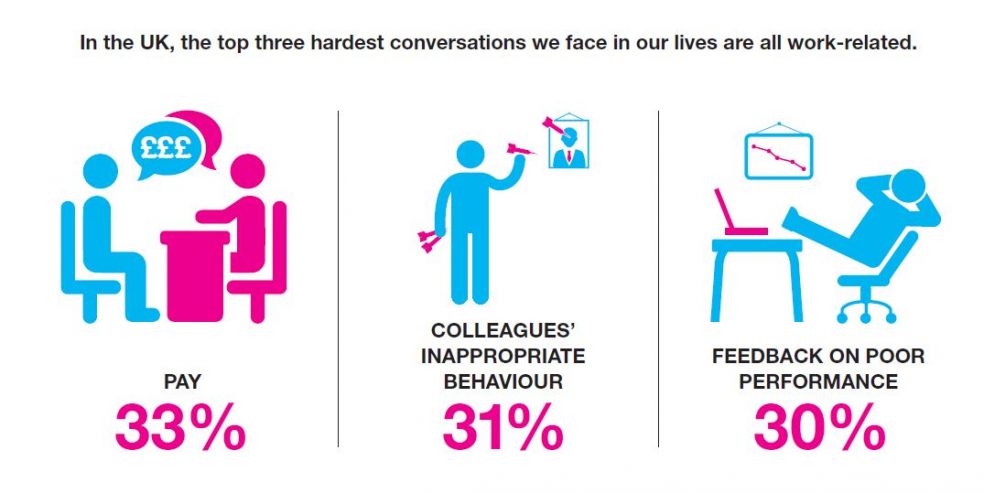
Awkward conversations at work are the hardest to face
Research released today (29 July) reveals that people in the South West find having difficult conversations tougher at work than at home.
The research conducted by the Chartered Management Institute (CMI) shows their top three tricky conversation topics are all work-related. Residents of the South West find it hardest to talk about negative feedback on work performance (34%) followed by pay (30%) and then tackling a colleague’s inappropriate behaviour (28%). This compares to personal topics like sex (12%), relationship break ups (17%) and money (19%), which the public feels are less hard to tackle.
The workplace is not only the setting for people’s most difficult conversations, it’s also where they happen most frequently. More than half of workers in the South West (51%) said they have to deal with a difficult conversation at work at least once a month or more.
Despite the regularity of awkward workplace exchanges CMI’s survey found employees and too many managers don’t have coping strategies. During difficult conversations at work over half of respondents(52%) from the South West said they mumble, stutter or trip over their words, whilst 40% clam up, and 41% let emotions take over from facts. 56% admitted taking things too personally during these exchanges.
The emotional upheaval of difficult conversations also takes its toll on workers in the region. The data show that knowing a difficult conversation is coming makes more than two-thirds of respondents (67%) feel stressed or anxious. Almost one in 10 (8%) said they slept badly or had nightmares in the lead up to a tricky work conversation. Yet, despite the impact of these awkward discussions on leaders and the workforce, over 89% of those surveyed in the South West have never had any training at all on how to tackle difficult conversations at work.
David Potter of CMI’s South West Regional Board, comments: “Our survey findings reveal that difficult conversations are really taking their toll on workers. When it comes to our home life we often rely on friends and family to support us with tricky discussions. At work, with no advice or training, it can feel like tiptoeing through a minefield. It’s no wonder 65% of people in the South West told us they would like to learn how to manage workplace conversations with more confidence.
“At CMI we want to help the UK’s workforce to feel calm and in control. That’s important whether you’re negotiating a pay rise with your boss, or talking to a colleague about their performance not hitting the mark. Managers are the lynchpin of so many businesses that they are often at the centre of these discussions. And, it’s not just the most junior or newest managers we want to help. This is an issue that cuts across all areas and all levels of business.”
The data reveal that senior managers find difficult conversations especially hard to handle. 40% of senior managers admitted they have panicked and told a lie when faced with a tricky conversation, and 43% owned up to losing their temper and shouting.
The survey also looked at the main reasons why people are so reluctant to tackle difficult conversations at work. Fear of not being able to get a point across clearly (35%) and concerns around getting upset or emotional (29%) both ranked highly. With barriers like this 57% of respondents in the South West agreed that they would do almost anything to avoid having a difficult conversation. Incredibly, over half (51%) of workers have put up with a negative situation at work rather than tackle a conversation about it.
David Potter continues: “It’s scandalous that so many people would rather be miserable at work than face a difficult conversation. This reluctance to talk things through not only has a negative impact on individuals, but can quickly affect wider team morale. That’s why CMI is here to help. Our top tips are easy to remember using the mnemonic TALK:
• T – Think about framing how you think about the conversation differently. Don’t label it as ‘difficult’. It may be about a tricky subject, but, by suggesting solutions or alternatives you can focus on constructive outcomes
• A – Always use clear, simple and neutral language. Refer to specific examples and facts
• L – Listen to what the other person is saying and hear their point of view. Show you care about how they see things
• K – Keep the focus on the issue, not the person
“By remembering to ‘TALK’ everyone can have more constructive conversations at work, whether you’re the boss, or a brand new manager.”
To help people access more advice and training to get better at handling difficult conversations at work, CMI has also put together a ‘Conversationalist’ quiz. Found at www.managers.org.uk/difficultconversations this helps managers identify how they normally approach difficult conversations, and what they could do differently. Join the conversation @cmi_managers #difficultconversations


















